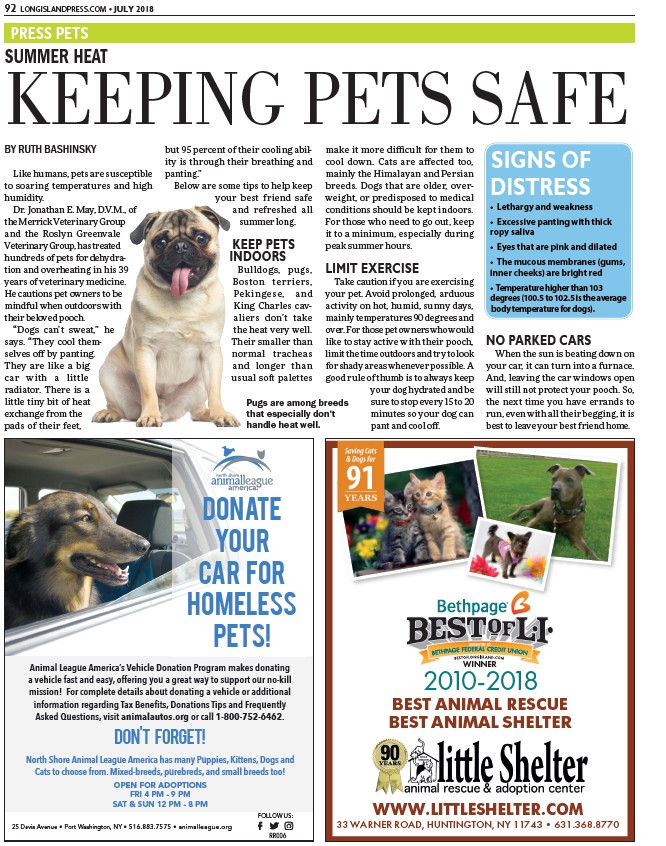
92 LONGISLANDPRESS.COM • JULY 2018
PRESS PETS
HEAT
SUMMER KEEPING PETS SAFE
BY RUTH BASHINSKY
Like humans, pets are susceptible
to soaring temperatures and high
humidity.
Dr. Jonathan E. May, D.V.M., of
the Merrick Veterinary Group
and the Roslyn Greenvale
Veterinary Group, has treated
hundreds of pets for dehydration
and overheating in his 39
years of veterinary medicine.
He cautions pet owners to be
mindful when outdoors with
their beloved pooch.
“Dogs can’t sweat,” he
says. “They cool themselves
off by panting.
They are like a big
car with a little
radiator. There is a
little tiny bit of heat
exchange from the
pads of their feet,
but 95 percent of their cooling ability
is through their breathing and
panting.”
Below are some tips to help keep
your best friend safe
and refreshed all
summer long.
KEEP PETS
INDOORS
Bulldogs, pugs,
Boston terriers,
Pekingese, and
King Charles cavaliers
don’t take
the heat very well.
Their smaller than
normal tracheas
and longer than
usual soft palettes
make it more difficult for them to
cool down. Cats are affected too,
mainly the Himalayan and Persian
breeds. Dogs that are older, overweight,
or predisposed to medical
conditions should be kept indoors.
For those who need to go out, keep
it to a minimum, especially during
peak summer hours.
LIMIT EXERCISE
Take caution if you are exercising
your pet. Avoid prolonged, arduous
activity on hot, humid, sunny days,
mainly temperatures 90 degrees and
over. For those pet owners who would
like to stay active with their pooch,
limit the time outdoors and try to look
for shady areas whenever possible. A
good rule of thumb is to always keep
your dog hydrated and be
sure to stop every 15 to 20
minutes so your dog can
pant and cool off.
NO PARKED CARS
When the sun is beating down on
your car, it can turn into a furnace.
And, leaving the car windows open
will still not protect your pooch. So,
the next time you have errands to
run, even with all their begging, it is
best to leave your best friend home.
Pugs are among breeds
that especially don’t
handle heat well.
SIGNS OF
DISTRESS
• Lethargy and weakness
• Excessive panting with thick
ropy saliva
• Eyes that are pink and dilated
• The mucous membranes (gums,
inner cheeks) are bright red
• Temperature higher than 103
degrees (100.5 to 102.5 is the average
body temperature for dogs).
DONATE
YOUR
CAR FOR
HOMELESS
PETS!
Animal League America’s Vehicle Donation Program makes donating
a vehicle fast and easy, offering you a great way to support our no-kill
mission! For complete details about donating a vehicle or additional
information regarding Tax Benefits, Donations Tips and Frequently
Asked Questions, visit animalautos.org or call 1-800-752-6462.
DON'T FORGET!
North Shore Animal League America has many Puppies, Kittens, Dogs and
Cats to choose from. Mixed-breeds, purebreds, and small breeds too!
25 Davis Avenue • Port Washington, NY • 516.883.7575 • animalleague.org
FOLLOW US:
OPEN FOR ADOPTIONS
FRI 4 PM - 9 PM
SAT & SUN 12 PM - 8 PM
RR006
WINNER
2010-2018
BEST ANIMAL RESCUE
BEST ANIMAL SHELTER
91
WWW.LITTLESHELTER.COM
33 WARNER ROAD, HUNTINGTON, NY 11743 • 631.368.8770